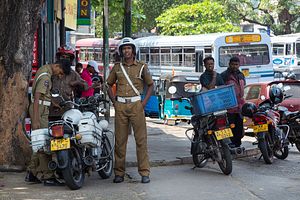Human Rights Watch (HRW), a leading international human rights organization, has come out with a new report that deals with police torture in Sri Lanka. In the summary section of the report, HRW lays out the grave nature of this problem clearly:
In this report, Human Rights Watch investigated allegations of police torture and other serious human rights violations in various parts of the country against criminal suspects. We found that police frequently use torture to try to obtain confessions rather than undertaking the more difficult and time-consuming process of gathering evidence through investigations. Police also use beatings and other forms of torture to punish suspects they believe are guilty, instead of leaving the matter properly to the courts. Our findings corroborate those of domestic human rights defenders who report that the use of torture and other ill-treatment is common, even for minor offenses.
Too often, crime scenes are not properly investigated as police seek quick confessions through coercive means; detainees are not brought before a magistrate within 24 hours as required by law; and magistrates do not give serious consideration to allegations of mistreatment, including by ensuring that the detainee receives proper medical attention from a judicial medical officer (JMO).
The report also documents examples of excessive use of force and arbitrary arrest and detention; it includes custodial deaths as well. This paper underscores the profound depth of the problem and the widespread impunity that continues to plague the island nation. It sets out a range of recommendations, too.
Importantly, HRW has included recent cases and cases which are less recent. For all the cases documented in the report, the organization notes that “victims reported severe ongoing emotional and psychological distress as a result of the abuse.” Reports such as these make for difficult (yet essential) reading. Ruki Fernando, a well-known Colombo-based human rights activist, doesn’t believe that the new government, which is led by President Maithripala Sirisena, has done nearly enough:
What’s captured in HRW report reflects what we know in Sri Lanka – torture is systemic, and there is widespread impunity, which promotes more torture. It has continued in 2015 under the new government and to my knowledge, the new government has not taken strong action to stop torture and address impunity, despite a commitment to this at the UN HRC sessions last month. The fact that some sections of Sri Lankan society condones torture as necessary means of justice compounds the problem.
Sri Lanka’s new government has promised to implement a panoply of significant measures, although the government’s reform agenda remains largely incomplete. Is Colombo ready to deal with police torture? Only time will tell.

































